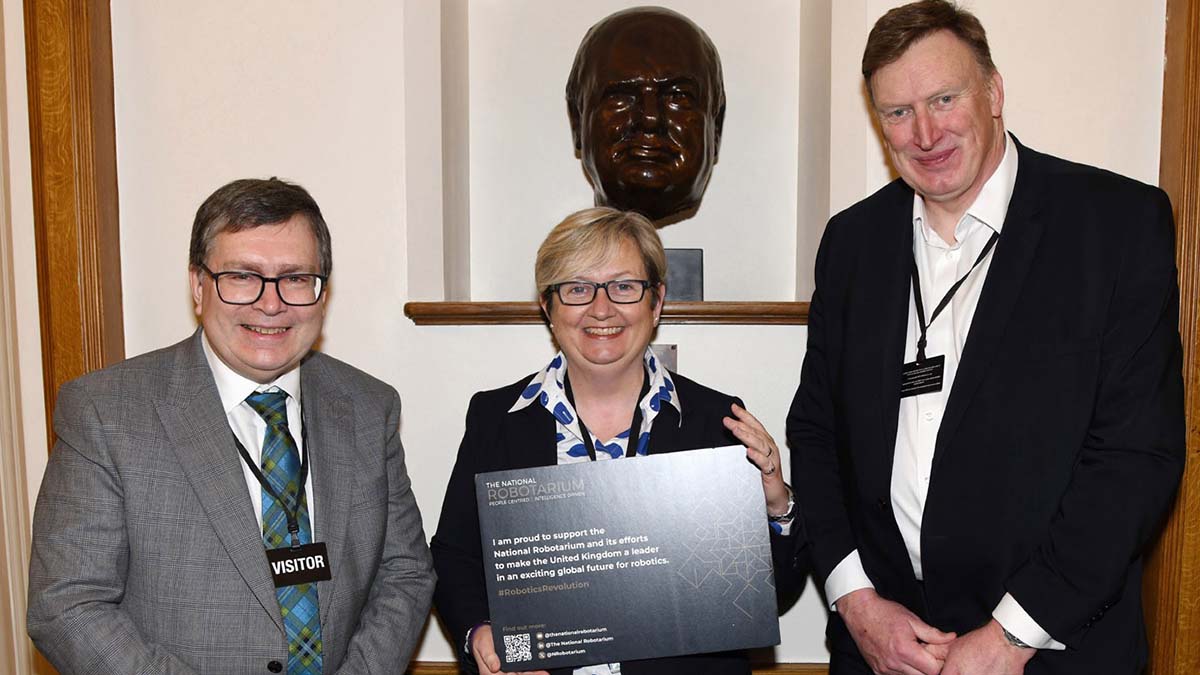Published:

The National Robotarium, one of Heriot-Watt University's leading Global Research Institutes, launched an ambitious manifesto at an exclusive event at the Houses of Parliament on Tuesday 5 March.
‘Reaping the Rewards of the Robotics Revolution: Making the UK an active player in the future global economy’ sets out a five-point plan for establishing the UK as a world-leader in robotics, including creating a Robotics UK agency to develop a national strategy, and investing in a UK-wide network of robotics centres inspired by the National Robotarium, based at Heriot-Watt University in Edinburgh.
The policy document highlights the success of the National Robotarium model in driving increased productivity, efficiency and skills development through robotics, and outlines how it can be used as a blueprint to put the UK at the heart of the global robotics revolution, estimated to be worth $283.19 billion by 2032.
“It is inevitable that robots will play a transformational role in the future of the world’s economy and society, and the UK needs to be on the front foot to embrace this change.
Sponsored by Heriot-Watt’s local MP Joanna Cherry, the event held at Parliament brought together key stakeholders from science, industry and policy to hear talks from Heriot-Watt Principal and Vice-Chancellor Professor Richard Williams, National Robotarium Chief Executive, Stewart Miller, and an impressive roster of robotics start-ups - Touchlab Ltd, Crover, and BioLiberty - that are utilising the facility’s business acceleration and incubation support.
Former Secretary of State for Science, Innovation and Technology, Chloe Smith MP, spoke on behalf of the UK Government, before joining Stewart, Professor Adam Stokes, Robotarium academic co-lead at partner institution The University of Edinburgh, and Director of the Robotics Growth Partnership Professor David Lane for an in-depth panel discussion and Q&A.
Deputy Principal for Business and Enterprise, Professor Gill Murray, was also in attendance, speaking to delegates about the University's ongoing success supporting start-ups and spinouts.
Like much of the work at Heriot-Watt University, it plays an important role in providing a place where academic research meets industry to find practical robotic applications to the world's biggest challenges.
Stewart Miller said: “It is inevitable that robots will play a transformational role in the future of the world’s economy and society, and the UK needs to be on the front foot to embrace this change.
“By getting to showcase the ongoing success of the National Robotarium – which has already accomplished so much in its first 18 months – and speak directly to policymakers within the walls of Parliament, I am hopeful that decision makers will recognise this opportunity and adopt our ambitious plans that seek to move the UK from passive consumer to active player in the robotics market.
“But to be a benefactor of this multi-billion-dollar industry, we must act now.”
Event sponsor Joanna Cherry MP also spoke at the event. She said:
“I was pleased to host this event for the National Robotarium, it is wonderful to have such a world-leading centre for robotic innovation, in my Edinburgh South-West constituency.
“The centre was created through funding by UK & Scottish Governments as part of the Edinburgh and South East Scotland City Region Deal. Like much of the work at Heriot-Watt University, it plays an important role in providing a place where academic research meets industry to find practical robotic applications to the world's biggest challenges.
“With robotics set to play a massive part in the future of workplaces, health and care, and our home life, there is a massive opportunity ahead.”